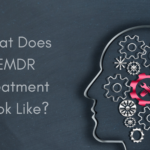The need to be perfect, or perfectionism, is a trait that is often praised. Trying to be perfect may be associated with being a high achiever, being successful, or other qualities that are valued in our culture.

Perfectionism is not a vehicle to self-improvement. Perfectionistic thinking and behavior is draining, never-ending, and rigid. It can zap joy and leave us feeling exhausted and never quite enough. It can also at times put a strain on our relationships as these expectations can easily be placed on others, not just ourselves.
Where does perfectionism come from? And how can EMDR (Eye Movement, Desensitization and Reprocessing) help?
Perfectionism may be caused by many different things for different people. It can be a mask for depression and anxiety. It can be an adaptation made at a very young age to help manage chaos. Perhaps being perfect was modeled by caregivers and also expected in return. If the need to be perfect has become part of your narrative about yourself, you may notice how much it impacts what you take on and how much you try to please others. This is likely rooted in deeper beliefs that were formed at some point in your life. For those who experienced past disturbing or traumatic experiences, negative beliefs about yourself can grow from these experiences. I’m not good enough, I’m not worthy, I don’t matter. When we carry these beliefs, they influence us in many critical ways. Trying to be perfect may be one of the ways in which we try to cope with, or even cover up, negative beliefs about ourselves. We may try to cover up this deeper shame by trying to be perfect all of the time, but this only drives the shame more because it’s unattainable.





